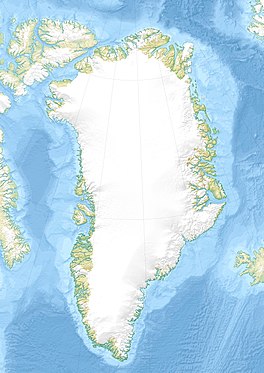Christian IV Glacier (Danish: Christian IV Gletscher or Kong Christian den IV's Gletscher) is a large glacier on the east coast of the Greenland ice sheet.[1] It is named after King Christian IV of Denmark (1577 – 1648). Administratively this glacier is part of the Sermersooq Municipality.[2] The area surrounding Christian IV Glacier is uninhabited.
| Christian IV Glacier | |
|---|---|
| Christian IV Gletscher | |
 The southward bend in the Christian IV Glacier with the Gronau Nunataks in the background and the NW part of the Watkins Range on the right. | |
| Type | Valley glacier |
| Location | Greenland |
| Coordinates | 68°55′N 30°30′W / 68.917°N 30.500°W |
| Length | 177 km (110 mi) |
| Terminus | Denmark Strait North Atlantic Ocean |
Geography
editThe Christian IV Glacier is a non-surge type valley glacier that does not drain the ice sheet directly, but flows partly from it across the mountainous areas of the Gronau Nunataks through the Gronau Glacier and the Grønlands Styrelse Glacier tributaries.[3] Further south it separates the Lindbergh Range in the west from the Watkins Range in the east, flowing in a roughly north–south direction[1] until its terminus at the head of the Nansen Fjord in the East Greenland coast.[4]
This fast-flowing glacier is similar in structure to the neighbouring Kronborg Glacier. It is one of the longest glaciers in Greenland, and with a width of up to 24 km (15 mi), it is comparable in approximate length and width to the Beardmore Glacier in Antarctica.[5]
See also
editFurther reading
edit- Spencer Apollonio, Lands That Hold One Spellbound: A Story of East Greenland, 2008
References
edit- ^ a b "Christian IV Gletscher". Mapcarta. Retrieved 29 July 2016.
- ^ Google Earth
- ^ Arctic Summits - Pilotsbjerg
- ^ Prostar Sailing Directions 2005 Greenland and Iceland Enroute, p. 110
- ^ Brooks, C.K. Geomorphological Observations at Kangerdlugssuaq, East Greenland, Greenland Geoscience, Vol 1, 1979 p. 16
